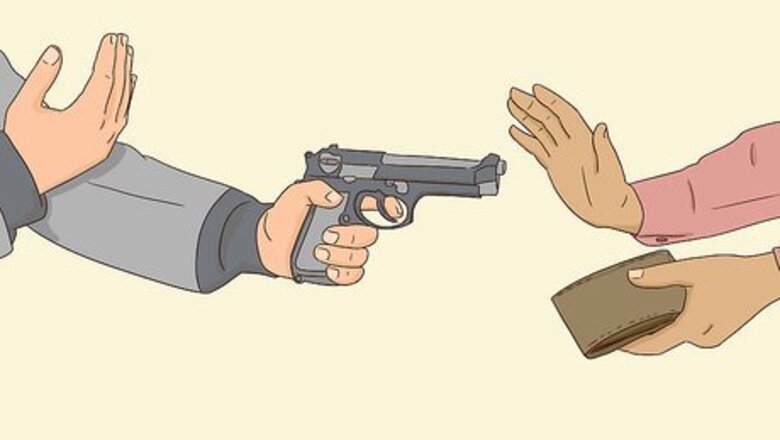
views
- Obey the robber's instructions, even if they end up taking your money. Don't give them a hard time.
- Don't stare at the robbers. If you look at them, only do so for 1-2 seconds at a time.
- Stay put and don't try to be a hero. Instead, wait until the police arrive and give detailed descriptions of the robbers.
What to Do during the Robbery
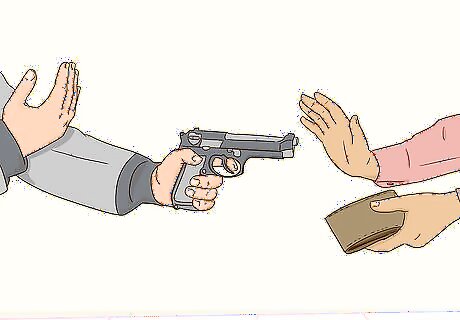
Comply with the robber's instructions. Listen to the bank robber’s instructions and follow them exactly as they give them. If they ask you to get down on the ground, comply as fast as possible. Give up any valuables or money that they request of you and don’t talk back to them or give them an attitude. If the bank robber didn't give you direct instructions or you can't understand their instructions, just lie down and put your hands behind your head. Remember—there's nothing that's worth more than your life. Money can be replaced, but your life can't.
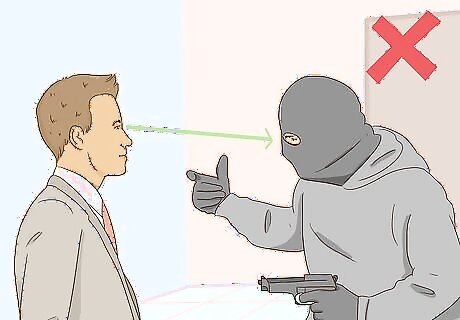
Don’t make eye contact or stare at the robbers. Bank robbers are likely to be extremely nervous and paranoid during the robbery. For this reason, it’s important that you don’t draw any attention to yourself or make it obvious that you’re trying to see what they look like. Avoid making direct eye contact with them, and don’t stare at them for more than 1 or 2 seconds at a time. Be aware of your surroundings. You may be able to notice what the bank robbers look like before the bank robbery occurs.
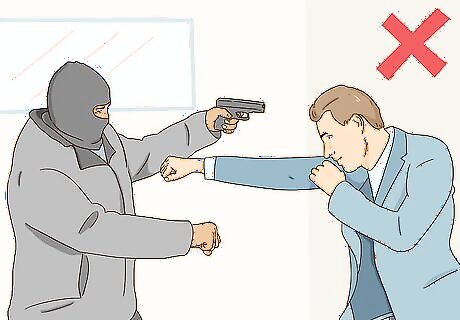
Don’t try to intervene in the robbery. Don’t try to fight the robbers or stop the robbery because you’ll likely get hurt or killed if you do so. The money in the bank is insured, so the bank isn't losing anything in the end. Instead of trying to stop an active robbery, you can help by giving accurate descriptions of the robbers to the police after the robbery occurs and the bank robbers have left. Try to remember things like their hair color or what they are wearing so that you can give a description to the police. If you have medical training, you can try to help the wounded after the robbers leave. Call the police and report the robbery as soon as you can.

Bring up a health condition you have to avoid being taken hostage. In very rare circumstances, the robbers may want to take hostages. If you are in perfect health, make up a story about medication that you need or health problems that you have. If you do have a health problem, explain that taking you hostage is a risk to your life. The robbers won't want any additional stress and it can prevent them from taking you hostage.

Stay calm. When the robbery starts, it’s likely to be chaotic and confusing. Breathe deeply and try to stay calm. Being in a heightened emotional state may cause you to do things that you normally wouldn’t do, so it’s important that you try to relax as much as possible throughout the duration of the robbery. Fear may temporarily immobilize you, so try to keep a clear head so you can react appropriately to the robbery. Read how to Stay Calm During a Robbery. If someone else is panicking you can calm them down by saying things like "We will get through this" or "It's scary but if we stay calm, we won't get hurt."
What to Do after the Robbery

Go home and take the next day off if you feel drained. There's a chance the robbery won't be as scary as you originally thought. If this is the case, you can just go on with your day as usual. After a robbery, however, there's a chance you’ll be emotionally and physically drained. Take the next day off from work or school if the robbery affected you so that you can give yourself time to process the emotions you had during and after the robbery.

Speak to a counselor. Try going to a crisis counselor 12-24 hours after the robbery to make sure that you are managing your emotions in a healthy way. Usually, the bank or police department will provide the counselors for free. They may suggest seeing a therapist for a period of time if you’re having problems processing the robbery in your mind. If your crisis counselor says everything is okay, it’s possible that fearful or anxiety-filled emotions may occur weeks or months after the robbery. In this case, you should consider seeing a therapist or psychiatrist.

Avoid obsessing over fearful thoughts of the future. It’s possible that after the robbery, you’ll develop a fear of it happening again in the future. Realize that bank robberies are a fairly uncommon occurrence. Don’t let your fear prevent you from going outside or going to the bank, and don’t obsess over thoughts of the future. It may help to write out the situation in a journal. You can try to face your fears by going back to the bank that was robbed. The more that you go back to the source of your fear, the less it will affect your life. If your fear is preventing you from going to school or work, you should see a professional therapist or counselor.










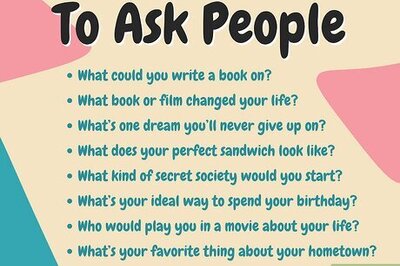







Comments
0 comment